Sports
Synchronized swimmer finds hope after decades of exile
Athlete Bill May returns to competition years after gender ban hobbled his dreams
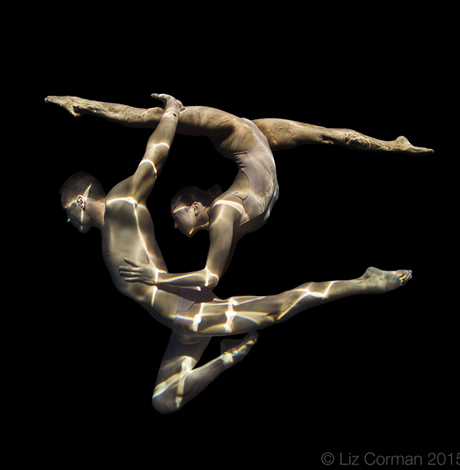
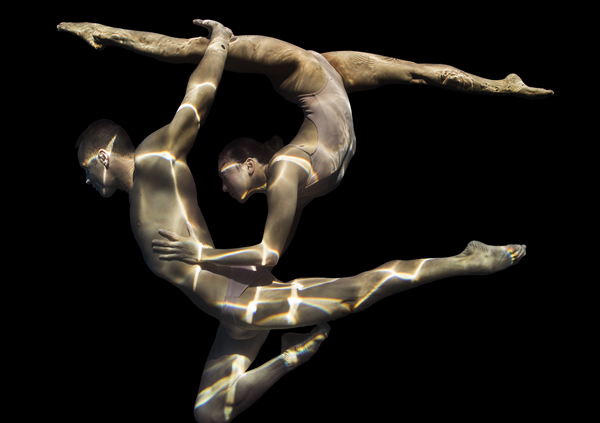
Bill May and partner Kanako Spendlove in performance. (Photo by Liz Corman Photography; used with permission)
Sometimes it just takes one person to initiate a major change. But it takes time. In the world of synchronized swimming, that person is Bill May.
May, who left home at age 16 to live with a host family in Santa Clara, Calif., where he could train, has for years been an advocate for male inclusion in the heretofore all-female world of the sport. And finally, there are signs that the tide is turning.
During a panel discussion at the recent International Swimming Federation (known as FINA or the Federation Internationale de Natation) congress in Ontario, Canada, longtime sports activist and Olympic swimming gold medalist, Donna de Varona, pointed out that diversity will result in growth for the aquatics community.
Synchronized swimming remains as the only FINA sport not equally represented by both sexes. As of the most recent 2016 Olympics in Rio, men are not allowed to compete in synchronized swimming events.
May started the sport by training and performing with two New York teams, the Syracuse Synchro Cats and the Oswego Lakettes. After moving to California, he tried out for the nationally renowned Santa Clara Aquamaids and earned a spot on their junior squad.
It was 1996 and as a young gay man, he was undaunted by the challenges facing him in a sport that wasn’t accepting of men. He wouldn’t be allowed to compete in most sanctioned events with his teammates because of his gender.
“I was pretty stubborn and was determined to stay in the sport I loved,” May says. “I still wanted to do it even if it meant I would never be allowed to compete in the Olympics. I took inspiration from friends on the swim team that continued to compete even though they would never make it to the Olympic level.”
May gained approval from FINA to compete in duet events in several competitions such as the 1998 Goodwill Games (silver), the 1999 Swiss Open (gold) and the 1999 French Open (gold). He was named the U.S. Synchronized Swimming Athlete of the Year in 1998 and 1999 and would go onto win the Grand Slam at the 2000 Jantzen Nationals.
Because of the lack of support he received from his own sport’s national federation, he was not allowed to compete at the 2004 Athens Olympics as they never filed for an inclusion. The President of the United States Synchronized Swimming Federation at the time, Ginny Jasontek, stated, “We cannot allow men to compete in a women’s sport.”
Bill May traveled to Athens in 2004 as a spectator to cheer on his teammates and then gracefully retired from the sport. By the next year, he was performing five days a week, two shows a night in the Las Vegas water-based production “O” by Cirque Du Soleil.
Fast-forward to November, 2014 when the news arrived that FINA had passed an inclusion to allow for the first time, two mixed-duet events at the 2015 FINA World Championships in Kazan, Russia. It was a major first step for a possible inclusion in future Olympics. A mad scramble ensued to reunite May with his former free routine partner, Kristina Lum Underwood, and find a new partner in Christina Jones for the technical routine.
With only eight months to train and with Underwood seven months pregnant, they had their work cut out for them. When the time came, they faced down nine teams on the world stage in Kazan with May and Jones winning the gold in the mixed-duet technical routine and May and Underwood taking the silver in the mixed-duet free routine. It was a long-awaited triumph just for May to compete in a sanctioned synchro world championships.
“After spending two weeks at the world championships, I realized that I wanted to see more mixed-duet teams competing and I wanted to see more mixed teams swimming differently than their female counterparts,” May says.
Now that the ball is rolling again, May is determined to push for mixed duets in the Olympics. He is one of many people who are working with U.S. Synchronized Swimming, FINA and the International Olympic Committee for inclusion. The 2016 Rio Olympics have passed by and the target is now for the 2020 Olympics in Tokyo.
https://www.youtube.com/watch?v=6dGXpgoIHeU
Both of May’s mixed-duet partners retired after the 2015 World Championships in Kazan and he began the search for a new partner shortly after returning to Las Vegas. He didn’t have to search far as his future duet partner had been swimming right in front of him all along.
Kanako Kitao Spendlove won a silver medal at the 2004 Athens Olympics in the synchro team competition for Japan. They had originally met at a junior open meet at the America Cup in 1996. She had been working with May at Cirque for almost 10 years and gave up her Japanese citizenship in December 2015 and became his new mixed-duet partner.
In their first competition together at the UANA Pan American Championships in Puerto Rico last September, they brought home the gold for the United States in the mixed-duet free routine. They have been named to the U.S. national synchro team through 2020.
Along with aiming for a chance to be included in the 2020 Tokyo Olympics, May and Spendlove are hoping to propose new rules and requirements for mixed duets.
“The mixed-duet free program shouldn’t be judged the same way as same-sex duets. We have connections, lifts and throws that they don’t include in same-sex duets,” May says. “What we are doing takes more strength not to mention that the roles are different, as opposed to being a mirror image. We also don’t want to be a direct comparison to same-sex duets as it would be a hindrance to growth.”
A few months after their success in Puerto Rico, May and Spendlove headed to Panama to host a mixed-duet synchro clinic. It was an attempt to draw more of the Americas into the sport as it is already gaining momentum in Europe.
Currently the duo is training four hours a day, six days a week in the pool along with their duties performing with Cirque. Their next big competition is the FINA World Championships in Budapest, Hungary in July where they will compete in both the technical and free mixed duets. Hopefully, that will bring them a step closer to inclusion in the 2020 Tokyo Olympics.
“Both of us love this sport, love performing and want to add a new dynamic to synchro,” May says. “We want to raise the level of athleticism and artistry to new heights.”
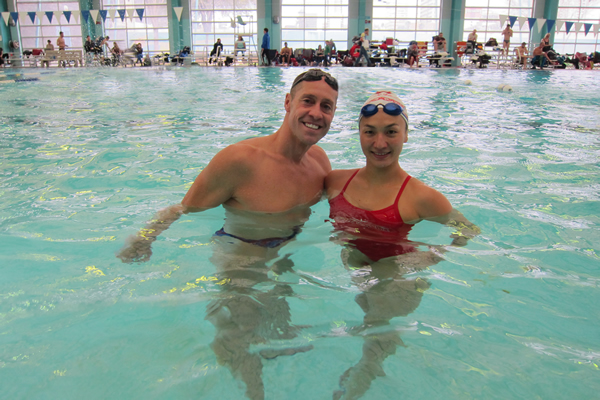
Bill May and partner Kanako Spendlove during a training session. (Photo by Kevin Majoros)
Sports
Brittney Griner, wife expecting first child
WNBA star released from Russian gulag in December 2022
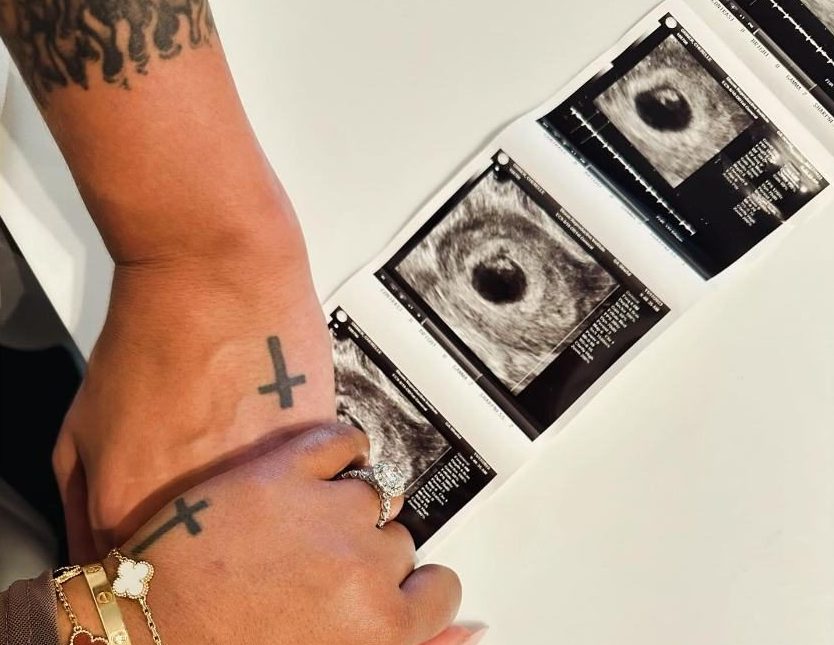
One year after returning to the WNBA after her release from a Russian gulag and declaring, “I’m never playing overseas again,” Phoenix Mercury star Brittney Griner and her wife announced they have something even bigger coming up this summer.
Cherelle, 31, and Brittney, 33, are expecting their first child in July. The couple shared the news with their 715,000 followers on Instagram.
“Can’t believe we’re less than three months away from meeting our favorite human being,” the caption read, with the hashtag, #BabyGrinerComingSoon and #July2024.
Griner returned to the U.S. in December 2022 in a prisoner swap, more than nine months after being arrested in Moscow for possession of vape cartridges containing prescription cannabis.
In April 2023, at her first news conference following her release, the two-time Olympic gold medalist made only one exception to her vow to never play overseas again: To return to the Summer Olympic Games, which will be played in Paris starting in July, the same month “Baby Griner” is due. “The only time I would want to would be to represent the USA,” she said last year.
Given that the unrestricted free agent is on the roster of both Team USA and her WNBA team, it’s not immediately clear where Griner will be when their first child arrives.
The Griners purchased their “forever home” in Phoenix just last year.
“Phoenix is home,” Griner said at the Mercury’s end-of-season media day, according to ESPN. “Me and my wife literally just got a place. This is it.”
As the Los Angeles Blade reported last December, Griner is working with Good Morning America anchor Robin Roberts — like Griner, a married lesbian — on an ESPN television documentary as well as a television series for ABC about her life story. Cherelle is executive producer of these projects.
Next month, Griner’s tell-all memoir of her Russian incarceration will be published by Penguin Random House. It’s titled “Coming Home” and the hardcover hits bookstores on May 7.
Sports
Applause and criticism for Staley’s trans-inclusive stance
South Carolina Gamecocks women’s coach made comments on Sunday
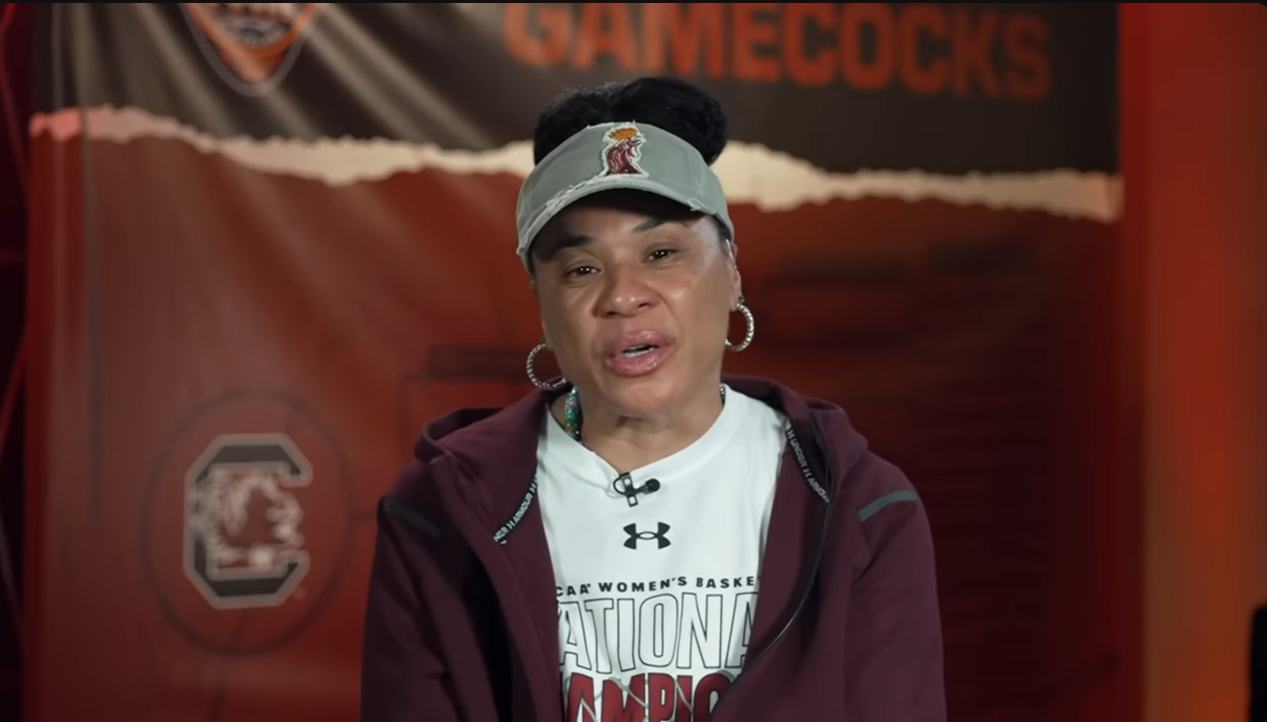
If not for a conservative transphobic blogger, this moment should be a celebration of NCAA women’s basketball coach Dawn Staley and the women of the South Carolina Gamecocks.
On Sunday, they concluded their undefeated season with a decisive win and a championship title. But when Staley faced reporters before that big game, Outkick’s Dan Zakheske asked her an irrelevant, clickbait question about transgender women in sports, referring to them as “biological males.”
Staley could have ignored the question, or stated she had no opinion, but instead the legendary coach offered a crystal clear endorsement of trans women competing in women’s sports, something outlawed in her home state of South Carolina for girls in kindergarten through college.
“I’m of the opinion,” said Staley, “If you’re a woman, you should play. If you consider yourself a woman and you want to play sports or vice versa, you should be able to play. That’s my opinion.”
Zakheske clearly wasn’t satisfied with that declaration of allyship and Staley swiftly cut him off.
“You want me to go deeper?” she asked.
“Do you think transgender women should be able to participate,” he started to say, when the coach stole the ball and took it downtown on a fastbreak. “That’s the question you want to ask? I’ll give you that. Yes. Yes. So, now the barnstormer people are going to flood my timeline and be a distraction to me on one of the biggest days of our game, and I’m okay with that. I really am.”
Staley is herself a Hall of Fame player a leading voice for diversity.
Reaction to her comments were swift, from LGBTQ rights organizations, athletes and inclusion opponents.
“Coach Staley simply spoke the truth that trans women are women and should play if they want,” said Sarah Kate Ellis, president and CEO of GLAAD, in a post on Instagram. “All of us can take a page from Coach Staley’s playbook as a sports leader and as a person of high integrity guided by faith, compassion and common sense.”
A White House pool reporter revealed President Joe Biden called Staley Sunday evening to congratulate her and the Gamecocks on their championship win. But it’s not clear if she and the president, an outspoken supporter of trans rights, discussed her remarks on trans athletes.
A number of Black leaders in the LGBTQ movement applauded Staley for taking a stand.
“Coach Staley has always been a trailblazer, but she’s also shown that true leadership is about advancing justice and equality for everyone,” said Human Rights Campaign President Kelley Robinson. “By expressing her full-throated support for transgender athletes’ inclusion in sports, she’s sending an important message — our shared humanity matters.
“Coach Staley showed courage and vulnerability, in choosing to answer the question and make a powerful statement of support for trans people on one of the biggest days and biggest stages in sports history,” said Kierra Johnson, executive director of the National LGBTQ Task Force, in a statement. “Not only does that make her a leader we can all aspire to like, it makes her a class act. She has etched her legacy in the history books with her play, her coaching, her heart and her smarts.”
In congratulating Staley on her championship title victory, Dr. David J. Johns, the CEO and executive director of the National Black Justice Coalition, also commended her for “her unwavering advocacy and support for transgender people in sports.”
“In a time when transgender athetes face unjust scrutiny, discrimination and exclusion from the National Association of Intercollegiate Athletics, her courage to speak truth to power and in support of inclusion and fairness sets a powerful example for us all, and is a testament to her integrity and compassion.”
The NBJC leader was referring to Monday’s announcement by the NAIA, the governing body of athletic programs at small colleges nationwide, voting 20-0 to essentially ban trans women from competing with other women beginning Aug. 1, as ESPN reported.
“It is a shocking and devastating development that the NAIA, an organization that has done so much to open doors, is now slamming those doors shut on transgender athletes,” said Sasha Buchert, Lambda Legal’s senior attorney and director of the organization’s nonbinary and trans rights project.
“Instead of standing up in support of transgender young people, the NAIA has simply turned its back on them — permanently depriving them of the benefits of competition. Would that they had the courage of victorious University of South Carolina women’s basketball coach Dawn Staley, who didn’t miss a beat in clarifying that transgender women should be able to play.”
However, praise for Staley’s stance was not universal.
Riley Gaines, failed former college swimmer and paid shill for the anti-inclusion organization, Independent Women’s Forum, called Staley “entirely incompetent or a sell-out” on Fox News. “Personally, I don’t think she believes what she said.”
Gaines has turned her fifth-place tie with out trans NCAA champion Lia Thomas into a career as a crusader against inclusion and a former advisor to the presidential campaign of Florida Gov. Ron DeSantis.
Val Whiting, a former Stanford University and professional women’s basketball player, tweeted her strong disagreement with Staley. “A lot of my basketball sisters feel differently but trans women do not belong in women’s sports. It’s not fair nor safe for biological women. There has to be another solution for trans women to be able to compete athletically besides having them compete against biological women.”
A lot of my basketball sisters feel differently but trans women do not belong in women’s sports. It’s not fair nor safe for biological women. There has to be another solution for trans women to be able to compete athletically besides having them compete against biological women.
— Val Whiting (@iamcoachval) April 7, 2024
Zaksheske’s Outkick colleague, anti-trans pundit David Hookstead, also went all-in with a transphobic post.
“Dawn Staley says she supports men who identify as women competing against real women in sports. Her view could literally destroy women’s basketball forever. Why won’t more people stand up for women?”
Dawn Staley says she supports men who identify as women competing against real women in sports.
— David Hookstead (@dhookstead) April 6, 2024
Her view could literally destroy women’s basketball forever.
Why won’t more people stand up for women? pic.twitter.com/2A59KTqvHb
Hookstead then boasted that Staley blocked his account.
Republican South Carolina Congresswoman Nancy Mace retweeted Zaksheske’s account of his interaction with Staley, calling her support of trans athletes “absolute lunacy.” That in turn won praise from Caitlyn Jenner, who retweeted Whiting and posted her thanks to Mace, along with this comment: “There is nothing complicated about this issue!”
What is complicated is that Jenner has never explained why she has competed with cisgender women in golf ever since her transition almost a decade ago.
You’re a hypocrite. pic.twitter.com/42DKwA9jmF
— Art Candee 🍿🥤 (@ArtCandee) April 7, 2024

Caitlyn Jenner flew from Malibu to New York this week to join her fellow Republicans in their nationwide quest to keep transgender girls and women from competing in sports with other women.
“Let’s stop it now while we can,” said the Olympic gold medalist, at a news conference carried live by Fox News Channel.
Republican Nassau County Executive Bruce Blakeman organized the event so that Jenner could speak in support of his February executive order banning trans athletes at more than 100 county-owned facilities.
“Trans women are competing against women, taking valuable opportunities for the long-protected class under Title IX and causing physical harm,” said Jenner without providing supportive evidence of her claim. Jenner said the ban would defeat “the woke agenda.”
Her comments drew praise from former NCAA swimmer and paid shill Riley Gaines, who represents the Independent Women’s Forum and has also worked with the failed presidential campaign of Republican Gov. Ron DeSantis of Florida on his anti-trans athlete platform.
We stand with Executive Blakeman as he faces shameful retaliation from @TishJames for merely protecting sports on the basis of sex
— Riley Gaines (@Riley_Gaines_) March 18, 2024
Thanks to you both, @Caitlyn_Jenner @NassauExec !!👏🏼 https://t.co/vAsWfayI7l
“If the left wants to fight this battle on this hill, it’s a losing battle,” said Jenner. “We will win the battle.” She claimed she spoke on behalf of women and girls, contradicting her past statements in support of trans girls competing according to their gender identity and despite the fact she herself still competes in women’s sports.
Shortly after the ban was announced last month, New York State Attorney General Letitia James and New York Gov. Kathy Hochul, both Democrats, denounced it and accused Blakeman of “bullying trans kids.”
James called the order “transphobic and deeply dangerous,” and argued that it violates the state’s anti-discrimination laws. The state attorney general challenged it in court March 1 with a “cease and desist letter,” demanding that Blakeman rescind the order, saying it subjects women’s and girls’ sports teams to “invasive questioning.”
As the Los Angeles Blade reported, Blakeman’s legal team countered with its own lawsuit on March 5, claiming her cease and desist letter violates the 14th Amendment’s equal protection clause.
“Not only was the executive order legal, but we had an obligation to defend it,” Blakeman said Monday.
The order has also been challenged by the New York Civil Liberties Union, which filed suit last week on behalf of a women’s roller derby league based in Nassau County that welcomes trans women and would be barred from using the county’s facilities by Blakeman’s executive order.
Just days before the Long Island news conference, Jenner joined Olympian Sharron Davies, who also campaigns against trans inclusion in sports, for an conversation with a British newspaper, the Telegraph, which has been outspoken against trans inclusion.
They recalled that in their day, tests to determine sex were mandatory in order to compete, and Jenner said she has been “pushing” for sex tests to return to sports, decades after sports organizations around the world abandoned the practice because they were unreliable. “If they continue down this road, it will be pretty much the end of women’s sport as we know it.”
“I can still hit a golf ball 280 yards,” Jenner continued, not mentioning she plays from the ladies’ tee. She did however opine about not being “a real woman,” acknowledging that many trans women disagree with her view.
“They keep saying, ‘Oh, I’m a real woman, I’m a real woman,’ and I’m going, ‘No, you’re not,’” said Jenner. “I will use your preferred pronouns, I will treat you as a female, you can run and dress and do whatever you want, I have nothing against that, it’s fine, but biologically you’re still male.”
She added: “Let me explain — I am biologically male, OK? I’m XY. There’s nothing I can do to change that. If you believe in gender dysphoria, and I think most people do realize it’s not a disease, it’s a mental condition, just like some people are left-handed and some people are right-handed, it’s kind of the way you’re born and I’ve dealt with it my entire life.“
“I consider myself a trans person, I am still genetically male, I changed all of my ID right down to my birth certificate so technically yes, I am female, but on the other hand I know I’m not.”
















